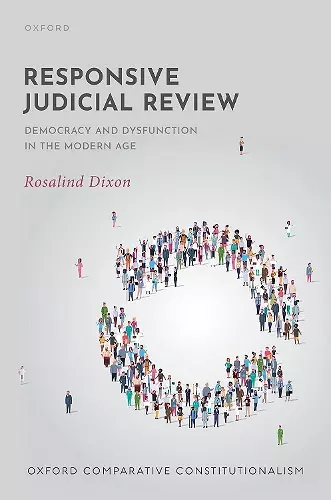Responsive Judicial Review
Democracy and Dysfunction in the Modern Age
Format:Hardback
Publisher:Oxford University Press
Published:16th Feb '23
Should be back in stock very soon

Democratic dysfunction can arise in both 'at risk' and well-functioning constitutional systems. It can threaten a system's responsiveness to both minority rights claims and majoritarian constitutional understandings. Responsive Judicial Review aims to counter this dysfunction using examples from both the global north and global south, including leading constitutional courts in the US, UK, Canada, India, South Africa, and Colombia, as well as select aspects of the constitutional jurisprudence of courts in Australia, Fiji, Hong Kong, and Korea. In this book, Dixon argues that courts should adopt a sufficiently 'dialogic' approach to countering relevant democratic blockages and look for ways to increase the actual and perceived legitimacy of their decisions—through careful choices about their framing, and the timing and selection of cases. By orienting judicial choices about constitutional construction toward promoting democratic responsiveness, or toward countering forms of democratic monopoly, blind spots, and burdens of inertia, judicial review helps safeguard a constitutional system's responsiveness to democratic majority understandings. The idea of 'responsive' judicial review encourages courts to engage with their own distinct institutional position, and potential limits on their own capacity and legitimacy. Dixon further explores the ways that this translates into the embracing of a 'weakened' approach to judicial finality, compared to the traditional US-model of judicial supremacy, as well as a nuanced approach to the making of judicial implications, a 'calibrated' approach to judicial scrutiny or judgments about proportionality, and an embrace of 'weak – strong' rather than wholly weak or strong judicial remedies. Not all courts will be equally well-placed to engage in review of this kind, or successful at doing so. For responsive judicial review to succeed, it must be sensitive to context-specific limitations of this kind. Nevertheless, the idea of responsive judicial review is explicitly normative and aspirational: it aims to provide a blueprint for how courts should think about the practice of judicial review as they strive to promote and protect democratic constitutional values.
In this masterful work, Rosalind Dixon returns judicial representation-reinforcement to center stage in our understanding of judicial review. Her theory of how judicial intervention can counteract democratic dysfunction is rooted in rich examples and a breadth and depth of comparative expertise that reflects her position as a leading scholar in the field. What makes this book of exceptional importance is its close attention to the opportunities and challenges in operationalizing responsive judicial review; Dixon speaks directly to judges in outlining how constitutional courts might function as democracy-protecting and democracy-promoting. In presenting a theory of judicial review alongside guidance for its implementation, Dixon reanimates our aspirations for courts as valued participants in achieving a society committed to democratic responsiveness. * Erin F. Delaney, Professor of Law, Northwestern University Pritzker School of Law *
Comprehensive in its sweep, systematic in its analysis, and yet distinctive in its focus, Rosalind Dixon's insightful book is a major contribution to the growing comparative literature on political process approaches to constitutional review. * Stephen Gardbaum, Stephen Yeazell Endowed Chair in Law, UCLA *
Professor Dixon has written a landmark book on the theory of judicial review. Using excellent examples drawn from around the world, she shows how courts should modulate their decision-making in response to legal, social, and political context. Her book will become the go-to resource for the field, on which all future work will build. * David Landau, Mason Ladd Professor and Associate Dean for International Programs, Florida State University College of Law *
ISBN: 9780192865779
Dimensions: 242mm x 164mm x 24mm
Weight: 624g
320 pages